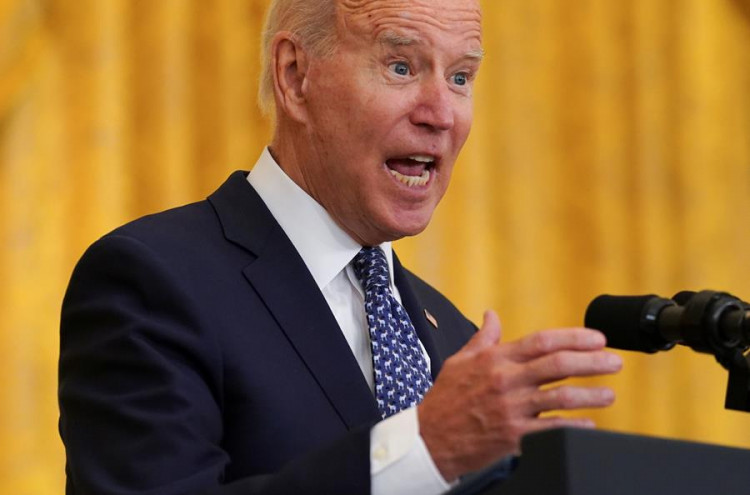President Joe Biden on Saturday hailed the Israeli airstrike that killed Hezbollah leader Hassan Nasrallah as a "measure of justice" for the victims of his decades-long "reign of terror." The remarks come after Lebanon's Hezbollah confirmed that Nasrallah, one of the group's founding leaders, was killed in an Israeli airstrike on Friday in Beirut.
Biden emphasized that the strike took place in the broader context of the escalating conflict that began with Hamas' deadly attack on Israeli civilians on October 7, 2023. "Nasrallah, the next day, made the fateful decision to join hands with Hamas and open a 'northern front' against Israel," Biden noted, underscoring Hezbollah's critical role in expanding the war against Israel. He further pointed out that Hezbollah, under Nasrallah, had been responsible for thousands of deaths, including those of Americans.
Hezbollah's past attacks on U.S. interests include the bombing of the U.S. Embassy in Beirut in 1983 and the kidnapping of the CIA's Beirut station chief. Hezbollah has long been a key player in Iran's regional influence, frequently targeting Israel and U.S. interests across the Middle East. The group has also armed and trained militias that carried out attacks on U.S. forces during the Iraq War.
The White House considers Nasrallah's death a significant blow to Hezbollah but remains cautious about further escalations in the region. While Israel's operation was conducted without direct U.S. forewarning, both Biden and Vice President Kamala Harris reiterated their desire to avoid the ongoing Israel-Hamas war expanding into a full-scale regional conflict. "President Biden and I do not want to see conflict in the Middle East escalate into a broader regional war," Harris said in a statement, echoing Biden's assertion of Nasrallah's killing as "a measure of justice."
Despite Nasrallah's death, the situation in the region remains volatile. Israeli Prime Minister Benjamin Netanyahu, in a speech to the United Nations on Friday, vowed to continue military operations against Hezbollah until the tens of thousands of Israeli citizens displaced by rocket attacks could return home. Hours later, Israel launched the airstrike that took out Nasrallah.
The strike has drawn mixed reactions. Iranian President Masoud Pezeshkian condemned the U.S. for its support of Israel, accusing Washington of complicity in the assassination. "The world community will not forget that the order of the terrorist strike was issued from New York," Pezeshkian stated on Iranian state television, further stoking tensions between Tehran and Washington.
The killing of Nasrallah reveals the deep penetration of Hezbollah by Israeli intelligence, according to sources familiar with the matter. Israel's military has spent decades refining its intelligence operations against Hezbollah, culminating in the recent series of targeted strikes that have decimated much of the group's leadership structure. Israeli sources revealed that Prime Minister Netanyahu and his inner circle approved the strike while Netanyahu was in New York for the U.N. General Assembly.
"This is a massive blow and intelligence failure for Hezbollah," said Magnus Ranstorp, a Hezbollah expert at the Swedish Defence University. "They knew that he was meeting with other commanders, and they just went for him."
Israeli military officials described the strike as a meticulously planned operation. Brigadier General Amichai Levin, commander of Israel's Hatzerim Airbase, revealed that dozens of munitions hit the target within seconds, eliminating Nasrallah and several senior commanders.
While Hezbollah has been quick to replace fallen leaders in the past, Nasrallah's death represents a severe disruption to the group's operations. His successor, likely to be Hashem Safieddine, has long been tipped to take the reins, but experts believe Hezbollah will be materially and psychologically weakened following Nasrallah's assassination.
Despite Hezbollah's extensive resources, including an estimated 40,000 fighters and a large arsenal of rockets and drones, Israel's recent offensive has dealt significant blows to the group. Israeli officials estimate that 20-25% of Hezbollah's missile capacity has been destroyed in the past week alone. The death of eight of Hezbollah's top nine military commanders, including Nasrallah, underscores the effectiveness of Israel's operations in degrading the group's capabilities.
Before the strike on Nasrallah, Iran was reportedly planning to send additional missiles to Hezbollah in preparation for a prolonged war, according to Iranian sources. However, Israel's strikes on Hezbollah's supply lines have severely impacted the group's ability to replenish its weapons.
The Biden administration remains focused on preventing the conflict from escalating further. In response to rising tensions, the State Department ordered the departure of nonessential U.S. embassy staff and their families from Beirut. The U.S. embassy has also provided guidance to Americans in Lebanon, urging them to leave while commercial options remain available.
As U.S. forces in the region are placed on higher alert, Biden has called for a cease-fire, reiterating the need for diplomacy. "It's time for a cease-fire," Biden said on Saturday, stressing that peace in the Middle East remains the ultimate goal.






